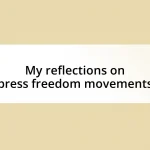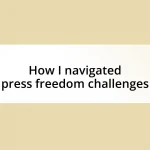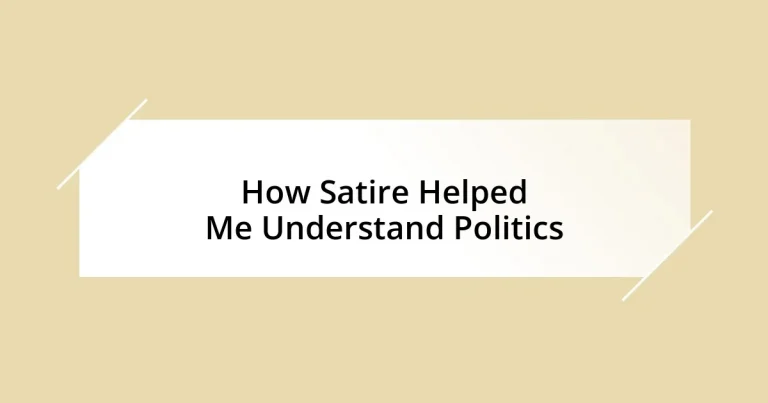Key takeaways:
- Satire simplifies complex political issues, making them more accessible and encouraging critical thinking.
- It fosters civic engagement by prompting discussions and creating a sense of community through shared humor.
- Key satirical works like *The Daily Show* and *Saturday Night Live* illustrate the power of comedy to hold political figures accountable and highlight societal flaws.
- Engaging with satire can transform laughter into meaningful conversations about political behavior and governance.
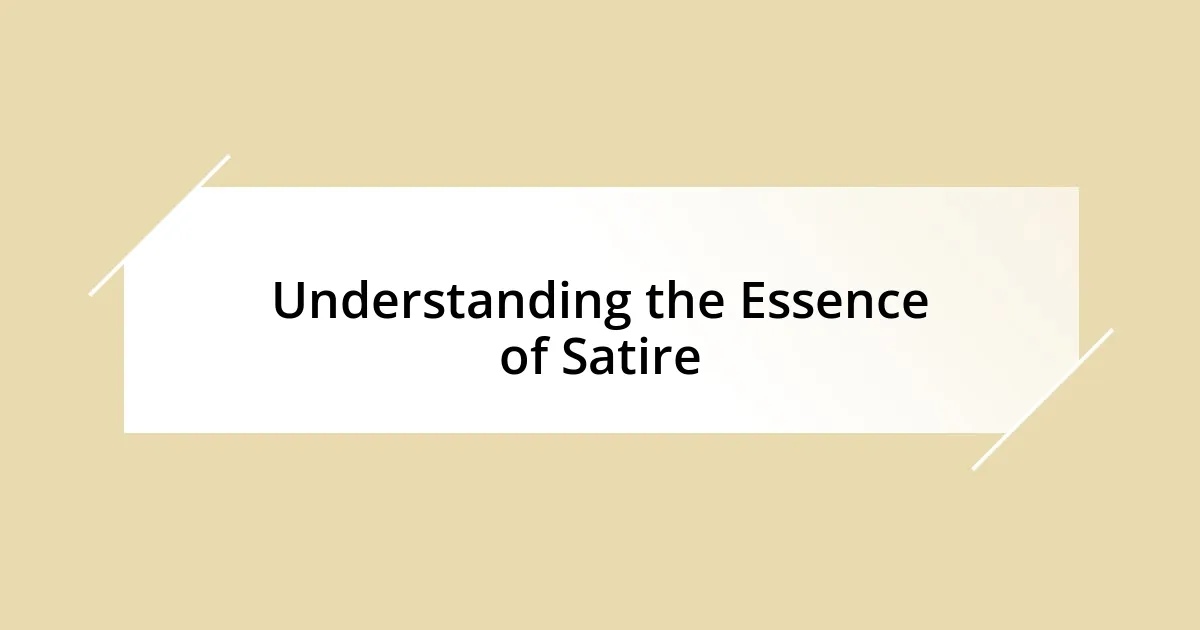
Understanding the Essence of Satire
Satire, at its core, distills the complexities of politics into bite-sized, often humorous critiques that expose deeper truths. I remember the first time I watched a satirical news show; it felt like a lightbulb moment. Suddenly, I was laughing at absurdities I had previously taken seriously, prompting me to question not just the jokes but the very structures they were poking fun at.
When I think about satire, I see it as a mirror reflecting the ridiculousness of political situations we often overlook. It’s fascinating how a clever quip can cut through the noise and reveal deeper imperfections in governance. Have you ever found yourself laughing at a satirical portrayal of a politician, only to realize that the absurdity hits uncomfortably close to reality? That’s the power of satire—it can be both entertaining and enlightening.
Engaging with satire invites us to critically evaluate the world around us. It’s not just about the wit; it’s about prompting necessary conversations. I often feel a sense of relief when I connect with others over shared satirical moments, as if we’ve uncovered a hidden truth together. Those moments remind me that humor can be a powerful tool for social commentary, offering insights that conventional discourse sometimes misses.
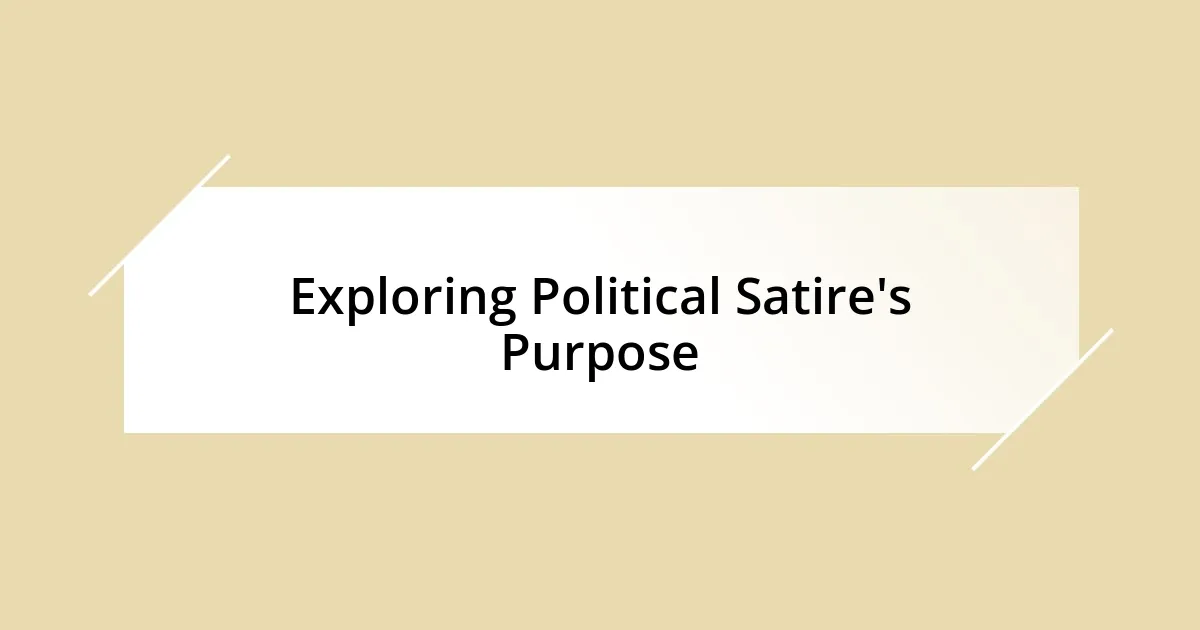
Exploring Political Satire’s Purpose
Political satire serves several crucial purposes that deepen our understanding of governance and societal issues. I remember staying up late, glued to a popular satire show, where I discovered that humor could unveil the follies of leaders in ways that dry news coverage often failed to capture. It’s like holding a magnifying glass over political absurdities; suddenly, they become tangible and worth scrutinizing.
Here are some key elements of political satire’s purpose:
– Fostering Critical Thinking: It invites the audience to analyze events rather than passively consume information.
– Addressing Complex Issues: Satire simplifies intricate political matters, making them accessible and understandable.
– Promoting Civic Engagement: It sparks discussions and debates, encouraging viewers to become more involved citizens.
– Highlighting Injustice: By exaggerating flaws, satire shines a light on societal problems often overlooked.
– Creating a Sense of Community: Shared laughter over satire creates bonds among people with similar concerns about political issues.
I find it interesting how every new episode can light a fire under my curiosity or even motivate meaningful conversations with friends. Those moments when we dissect a recent satirical take on a politician feel refreshing, as if we’re piecing together a more coherent view of the chaotic political landscape around us.
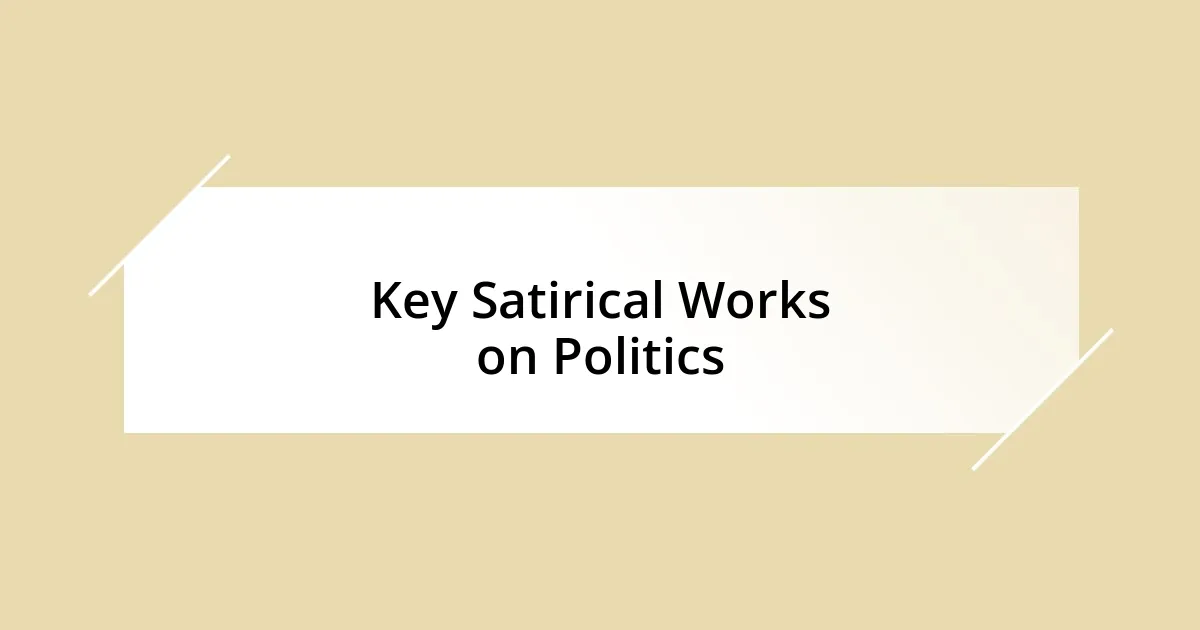
Key Satirical Works on Politics
Throughout the years, several satirical works have made significant impacts on how we perceive politics. For example, The Daily Show revolutionized political commentary by blending humor with insightful critiques of current events. Watching Jon Stewart deftly navigate the absurdities of political debates truly opened my eyes; it was as if he had unlocked a door to understanding the narratives shaped by media.
Another standout is *Saturday Night Live*, which has a storied history of lampooning politicians and their missteps. I fondly recall the infamous sketches targeting various administrations, and how they helped me realize that humor could be a powerful tool for holding leaders accountable. The clever impersonations not only entertained but also made me more aware of political trends and issues I might have otherwise overlooked.
Works like *The Onion* have also played a key role in political satire. Its satirical articles make outlandish claims that, while fictional, often mirror the bizarre nature of real news. Each time I share one of their headlines with friends, it leads to thoughtful discussions on why such absurdities, though exaggerated, often invoke conversations around actual policies and societal norms.
| Satirical Work | Impact on Political Understanding |
|---|---|
| The Daily Show | Transforms current events into relatable narratives. |
| Saturday Night Live | Exposes hypocrisy while keeping audiences engaged through comedy. |
| The Onion | Encourages critical thinking by exaggerating absurdities. |
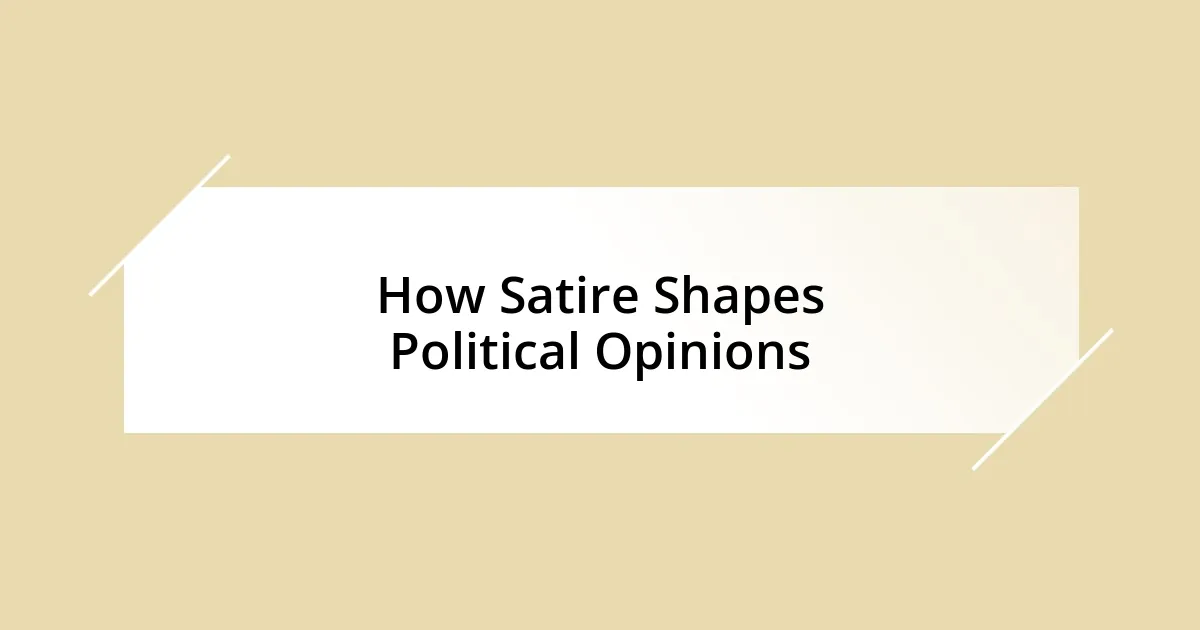
How Satire Shapes Political Opinions
Political satire has an incredible ability to shape our opinions by making complicated issues relatable. I recall a time when I came across a satirical skit about a recent election. As I chuckled through the punchlines, I found myself reflecting on the absurdity of certain policies and the candidates who championed them. Would I have thought about those issues so critically without the laugh? Probably not.
By exaggerating the flaws of political figures, satire brings societal problems into sharper focus. I remember watching a comedy segment that mocked a politician’s outrageous claim about a new policy. At that moment, I felt a sense of camaraderie with others who were equally bewildered. How could someone seriously propose something so disconnected from reality? It sparked discussions among my friends and me, pushing us to dive deeper into understanding the implications of such policies.
When humor meets politics, it fosters a unique environment for reflection and debate. I personally experience this every time I scroll through social media and see friends sharing satirical articles. These shared laughs aren’t just for entertainment; they serve as springboards for serious conversations. Isn’t it fascinating how a clever joke can lead to a serious analysis of political behavior? Through satire, what once felt like a maze of political jargon transforms into an engaging dialogue, allowing me to truly grasp the broader context of our political landscape.
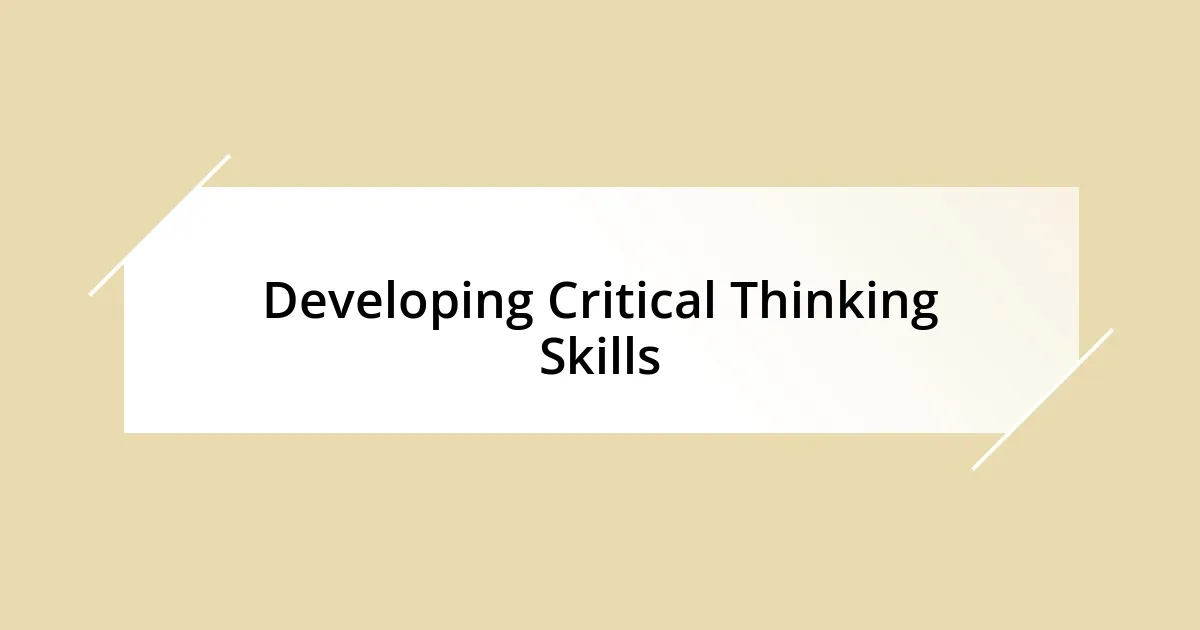
Developing Critical Thinking Skills
It’s intriguing how satire nudges me to think critically about politics. I remember watching a segment on a late-night show where they dismantled a politician’s convoluted speech piece by piece. At first, I laughed, but then I found myself reconsidering the actual points being made—and the lack of substance behind them. Isn’t it interesting how humor can strip away the fluff of political rhetoric, forcing us to confront uncomfortable truths?
In another instance, I came across a satirical meme that exaggerated the chaos of an ongoing political crisis. I shared it with a friend, and instead of just chuckling, we ended up analyzing the real implications of what was happening. This simple act of laughter sparked a deeper conversation about accountability and governance. How often do we take the time to peel back the layers of political narratives without that initial push from humor?
What fascinates me most is how satire challenges my perceptions and assumptions. I vividly remember a satire piece that portrayed an over-the-top fictional policy proposal—something so absurd that it sounded plausible in a bizarre way. It shocked me into realizing how similarly outrageous proposals could slip under the radar in real discussions. In this sense, satire serves as a mirror reflecting what might easily go unnoticed in the serious world of politics. It sharpens my critical thinking, transforming confusion into clarity.
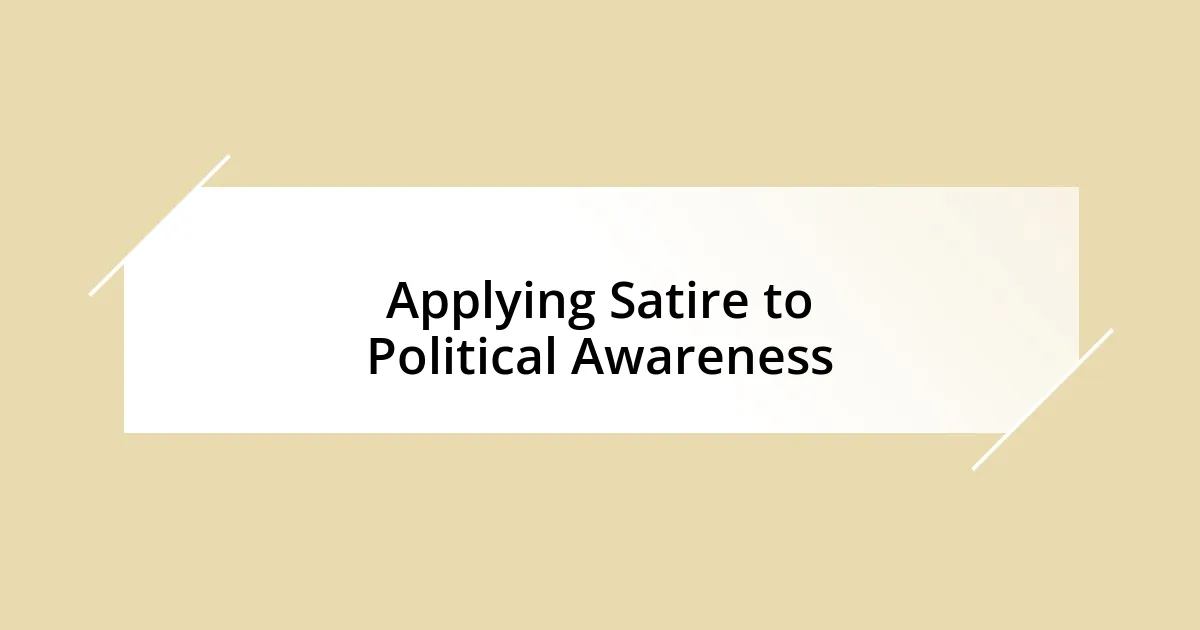
Applying Satire to Political Awareness
It’s incredible how satire can anchor my understanding of political dynamics. I remember watching a clever skit where comedians impersonated political leaders, mimicking their speech patterns and exaggerated gestures. The laughter felt contagious, but it also pushed me to examine why these figures often acted the way they did. How is it that humor can unveil such serious issues in a way that straightforward news often misses?
One time, I stumbled upon a satirical article discussing a government policy in a way that felt both insightful and hilarious. As I read, I couldn’t help but smirk at the absurdity outlined—like a political cartoon come to life. It made me think: why do we often overlook the ridiculousness in policies that directly affect our lives? Perhaps satire has that unique capability to cut through our defenses and force us to confront uncomfortable realities.
Engaging with satire has truly broadened my view of political discourse. After sharing a satirical video with some colleagues, we found ourselves in a passionate discussion about the implications behind the humor. It struck me how much more profound our conversations became once the laughter subsided. Isn’t it fascinating how a lighthearted moment can lead us toward a deeper understanding of critical issues? It reminds me that sometimes, humor acts as a catalyst for serious contemplation, bridging the gap between entertainment and education.






